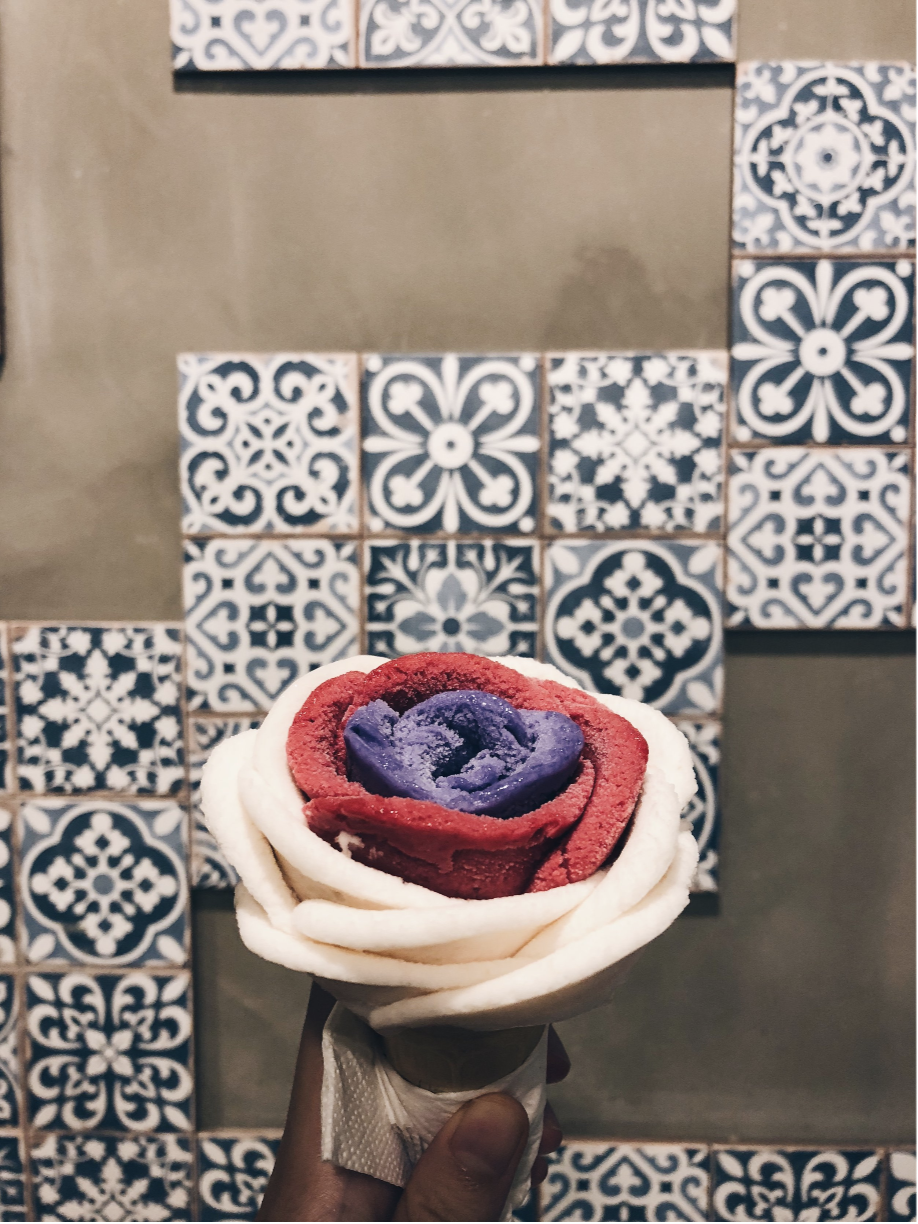"I would go vegan, but I love cheese!"
Sounds like you? Then keep reading!
A common reason for not going vegan, this statement is an unfortunate misconception which neglects the abundance of vegan alternatives to dairy-based products including—but not limited to—cheese. In this post, I will introduce you to five vegan replacements and where you can find them in Hong Kong to assuage your every craving. And just in case you need a refresher on why the vegans choose to avoid dairy products in the first place, here is the post where I examine the ethical concerns of the dairy industry.
1. Cheese
A shelf-full of Daiya products in Green Common
Not wanting to give up cheese is one of the most common excuses for not turning vegan or at least lowering one’s consumption of animal products. For that same reason, there are plenty of companies that have developed plant-based alternatives to cheese. This includes Daiya, which creates cheesy items ranging from a simple slice of cheddar style cheese to boxed mac & cheese that you can bring home and cook up in less than 30 minutes to ready-made vegan pizza. Many restaurants such as Kind Kitchen and Hemingway's incorporate Daiya cheese into their dishes, and while the texture is stickier than usual, they could easily fool anyone. With Daiya, you don't have to worry about missing out on any cheese item, because they have over 70 items that all contain 'cheese'. Most of these can be purchased at shops such as Green Common, Just Green, and sometimes even ParknShop! All their products are made with cassava and arrowroot, and the properties of these ingredients enable the ‘cheese’ to melt, shred and stretch. Moreover, their products are all gluten free, soy free, and "delicious dairy-free".
Some of their most popular items:
- Mac & Cheeze: this tastes very very 'cheese'-y so if you're not a huge fan of things that are overly cheesey, then I'd advise against this).
- Cheddar-style slices: perfect if you want to make yourself a toastie!
- Cheezecake: flavours include New York (original), Key Lime, Chocolate, and Strawberry.
Strawberry Cheezecake from Daiya (with some extra decoration)
Another vegan alternative to cheese is the brand Sheese. Similar to Daiya, Sheese sells sliced cheese such as 'cheddar', but they also offer spread-style 'cheese' such as cream sheese. These come in many different flavours—original, cheddar style, chives, garlic and herbs, etc. I have personally never bought any of these products before, but this is the 'cheese' used in restaurants such as Vegan & Mirror Concept, LN Fortunate Coffee, and Tequila Jack's (for their beyond burger). You can buy Sheese at Loving Hut or Be-Juiced, or you can give it a try at any of the restaurants listed above.
Unfortunately, as with most vegan substitutes, many of these products are heavily packaged in plastic. I try my best to avoid purchasing these items unless it’s truly necessary, and it goes without saying that the most sustainable alternative is to make your own using ingredients bought in bulk. There are thousands of recipes online to facilitate this experimentation—most that involve cashews, nutritional yeast, and other staple goods. However, these products nonetheless serve as convenient and accessible cheese replacements for those who are easing into the plant-based lifestyle or may not have the time to make their own. As always, as much as I love to advocate for minimal plastic usage and low-impact living, it’s important to embrace different approaches to going plant-based. This also applies to several of the other products that are listed below.
2. Yogurt
Yogurt was one of my favorite snacks before turning vegan, and even now, it still is. This is because there are countless yogurt brands that are soy-based, coconut-based, or even cashew-based. Some of the most popular brands include Alpro, Silk, Daiya, Forager, Nush and Hong Kong's very own health food brand, Foodcraft. All of these products can be purchased at City Super and most other health food stores including Green Common and Just Green. My personal favorite is the Silk blueberry flavored soy-based yogurt, as it reminds me of the yogurt parfaits I used to make for breakfast.
Tip: You can often find tubs of vegan yogurt for up to 50% off at City Super—just look out for the ones with a nearing expiry date. Not only will you avoid contributing to more food waste, you’ll be saving money, too!
3. Milk
Milk is no-doubt the easy dairy-based product to replace. I personally never really enjoyed milk (plus, humans are all lactose intolerant to some extent anyway) and prefer other versions made with soy and oat. As I discussed in this article, the rearing of cattle for meat production is associated with higher levels of greenhouse gas emissions, water use, and land use. Therefore, by extension, cow’s milk is also largely detrimental towards our environment. Luckily, there are plenty of vegan alternatives to milk—including ‘mylk’s that are made by blending almonds, soy, cashews, oat, and rice.
If all plant-based milks taste equally as good to you (a common concern) and you have trouble deciding which to drink, a great way to inform your decision is to measure up their varying environmental impacts. This comprehensive post by the new york times breaks down the carbon footprint of each:
In terms of water use, almond milk is noticeably worse than the others, but it terms of emissions, rice milk poses a greater problem. This is because of a process that occurs when paddies are purposefully flooded to suppress weeds and encourage growth. In that habitat, bacteria began to multiply and release methane (‘farting’, like cows do), causing rice emissions to increase.
Overall, soy milk appears to be the least harmful in terms of environmental impact. Moreover, soy milk has half as many calories as cow's milk, and contain just as much, if not more, protein per serving. Since soy milk is a fortified food, it also contains many essential nutrients needed to sustain a healthy diet. Potassium, iron, and vitamin B-12—the vitamin that is supposedly unattainable through a vegan diet—can all be found in these products.
However, as I mentioned in this post, another concern may be the colossal amount of plastic waste is generated from drinking milk out of tetra pak cartons. Probably the best thing about plant-based milk (or ‘mylk’) is that they can be easily made at home. Although I'm not a huge fan of almond milk, the one I blended myself was much creamier and flavourful that any other store-bought one I’ve tried. Just add in a few dates, cinnamon, and vanilla essence and you’ll have yourself a delicious, nutritious beverage. Even better is oat milk, which literally only requires you to blend oats.
4. Ice Cream
Another easily replaceable dairy-based staple food, vegan ice cream can be found at many places in Hong Kong—the most famous one being the Hong Kong based brand Happy Cow. Happy Cow’s desserts are made with coconuts, and while they come in an assortment of flavours, their texture remains consistently creamy. My personal favorites are the Dragon Berry flavour, which can be found at their stall by the Observation wheel, and the salted caramel flavour, which is also sold in cup-form in various retail stores such as Loving Hut, Green Common, Just Green, and even City Super.
Dairy-free ice cream from Igloo Dessert Bar
If you're not a fan of the coconut-based Happy Cow ice cream, there are also plenty of ice cream parlours around Hong Kong that sell sorbet—a fruity, dairy-free alternative to traditional ice cream. One of my favorites is Barista Givrés (pictured top right), because they arrange your ice cream into the shape of a rose. They have shops located in both Central and Wanchai, and their options include many unusual but delicious flavours such as butterfly pea flower, hibiscus flower, rose, and more.
If you want something more simple, you can also pay a visit to shops such as Grom in IFC, Venchi in Festival Walk, Season in Stanley, or Il Bel Paese in Discovery Bay to grab yourself some fruity vegan sorbet.
While sorbets serve as a wonderful and accessible alternative, I do agree that they often lack that extra creaminess offered by regular ice cream. Luckily, I recently stumbled upon Igloo Dessert and Bar—a simple stand located at the Central Star Ferry pier (pier 7)—which serves up multiple dairy-free ice cream flavours that vary by the week. While their unique rabbit candy flavoured ice cream is not available as a vegan option, they do boast several creative flavours including coconut water, crème brûlée, red velvet, and more. These are made with an almond milk base and are indistinguishable from your usual ice cream made with cow’s milk!
5. Nutella
Just like every other food item on sale, Nutella doesn't go without a vegan replacement. While browsing on iHerb last year, I came across a plant-based alternative to the commonly craved, sugary, chocolate hazelnut spread: Nutiva.
As it’s proudly noted on their label, Nutiva’s organic hazelnut spread contains 40% less sugar than 'the leading brand', Nutella. From 21 grams per serving to almost half of that at 12 grams, that's a whole lot less of sugar to consume. What's impressive is that the only real difference between the ingredients of the two items is the presence of milk (once again, refer to my post about dairy if you're wondering why vegans elect to boycott this industry), and in terms of taste, the only difference is that Nutiva is slightly less sweet.
Although Nutiva is slightly pricier than Nutella (as with various other vegan products), I view it as a pretty worthwhile investment—considering you'll be gaining a similar sense of satisfaction while saving money on your future hospital bills!








